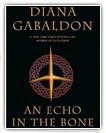Outlander aka Cross Stitch - Gabaldon Diana (библиотека электронных книг txt) 📗
My head fell back onto his shoulder. “I don’t know, Jamie. I really don’t.”
Chapter 18. RAIDERS IN THE ROCKS
“What did Captain Randall say?” I asked.
With Dougal on one side and Jamie on the other, there was barely room for the three horses to ride abreast down the narrow road. Here and there, one or both of my companions would have to drop back or spur up, in order to avoid becoming entangled in the overgrowth that threatened to reclaim the crude track.
Dougal glanced at me, then back at the road, in order to guide his horse around a large rock. A wicked grin spread slowly across his features.
“He wasna best pleased about it,” he said circumspectly. “Though I am not sure I should tell ye what he actually said; there’s likely limits even to your tolerance for bad language, Mistress Fraser.”
I overlooked his sardonic use of my new title, as well as the implied insult, though I saw Jamie stiffen in his saddle.
“I, er, don’t suppose he means to take any steps about it?” I asked. Despite Jamie’s assurances, I had visions of scarlet-coated dragoons bursting out of the bushes, slaughtering the Scots and dragging me away to Randall’s lair for questioning. I had an uneasy feeling that Randall’s ideas of interrogation might be creative, to say the least.
“Shouldn’t think so,” Dougal answered casually. “He’s more to worry about than one stray Sassenach wench, no matter how pretty.” He raised an eyebrow and half-bowed toward me, as though the compliment were meant in apology. “He’s also better sense than to rile Colum by kidnapping his niece,” he said, more matter-of-factly.
Niece. I felt a small shiver run down my spine, in spite of the warm weather. Niece to the MacKenzie chieftain. Not to mention to the war chieftain of clan MacKenzie, riding so nonchalantly by my side. And on the other side, I was now presumably linked with Lord Lovat, chief of clan Fraser, with the abbot of a powerful French abbey, and with who knew how many other assorted Frasers. No, perhaps John Randall wouldn’t think it worthwhile to pursue me. And that, after all, had been the point of this ridiculous arrangement.
I stole a glance at Jamie, riding ahead now. His back was straight as an alder sapling and his hair shone under the sun like a helmet of burnished metal.
Dougal followed my glance.
“Could have been worse, no?” he said, with an ironic lift of his brow.
Two nights later, we were encamped on a stretch of moorland, near one of those strange outcroppings of glacier-pocked granite. It had been a long day’s travel, with only a hasty meal eaten in the saddle, and everyone was pleased to stop for a cooked dinner. I had tried early on to assist with the cooking, but my help had been more or less politely rejected by the taciturn clansman whose job it apparently was.
One of the men had killed a deer that morning, and a portion of the fresh meat, cooked with turnips, onions, and whatever else he could find, had made a delicious dinner. Bursting with food and contentment, we all sprawled around the fire, listening to stories and songs. Surprisingly enough, little Murtagh, who seldom opened his mouth to speak, had a beautiful, clear tenor voice. While it was difficult to persuade him to sing, the results were worth it.
I nestled closer to Jamie, trying to find a comfortable spot to sit on the hard granite. We had camped at the edge of the rocky outcrop, where a broad shelf of reddish granite gave us a natural hearth, and the towering jumble of rocks behind made a place to hide the horses. When I asked why we did not sleep more comfortably on the springy grass of the moor, Ned Gowan had informed me that we were now near the southern border of the MacKenzie lands. And thus near the territory of both Grants and Chisholms.
“Dougal’s scouts say there’s no sign of anyone nearabouts,” he had said, standing on a large boulder to peer into the sunset himself, “but ye can never tell. Better safe than sorry, ye ken.”
When Murtagh called it quits, Rupert began to tell stories. While he lacked Gwyllyn’s elegant way with words, he had an inexhaustible fund of stories, about fairies, ghosts, the tannasg or evil spirits, and other inhabitants of the Highlands, such as the waterhorses. These beings, I was given to understand, inhabited almost all bodies of water, being especially common at fords and crossings, though many lived in the depths of the lochs.
“There’s a spot at the eastern end of Loch Garve, ye ken,” he said, rolling his eyes around the gathering to be sure everyone was listening, “that never freezes. It’s always black water there, even when the rest o’ the loch is frozen solid, for that’s the waterhorse’s chimney.”
The waterhorse of Loch Garve, like so many of his kind, had stolen a young girl who came to the loch to draw water, and carried her away to live in the depths of the loch and be his wife. Woe betide any maiden, or any man, for that matter, who met a fine horse by the water’s side and thought to ride upon him, for a rider once mounted could not dismount, and the horse would step into the water, turn into a fish, and swim to his home with the hapless rider still stuck fast to his back.
“Now, a waterhorse beneath the waves has but fish’s teeth,” said Rupert, wiggling his palm like an undulating fish, “and feeds on snails and waterweeds and cold, wet things. His blood runs cold as the water, and he’s no need of fire, d’ye ken, but a human woman’s a wee bit warmer than that.” Here he winked at me and leered outrageously, to the enjoyment of the listeners.
“So the waterhorse’s wife was sad and cold and hungry in her new home beneath the waves, not caring owermuch for snails and waterweed for her supper. So, the waterhorse being a kindly sort, takes himself to the bank of the loch near the house of a man with the reputation of a builder. And when the man came down to the river, and saw the fine golden horse with his silver bridle, shining in the sun, he couldna resist seizing the bridle and mounting.
“Sure enough, the waterhorse carries him straight into the water, and down through the depths to his own cold, fishy home. And there he tells the builder if he would be free, he must build a fine hearth, and a chimney as well, that the waterhorse’s wife might have a fire to warm her hands and fry her fish.”
I had been resting my head on Jamie’s shoulder, feeling pleasantly drowsy and looking forward to bed, even if that was only a blanket spread over granite. Suddenly I felt his body tense. He put a hand on my neck, warning me to keep still. I looked around the campsite, and could see nothing amiss, but I caught the air of tension, running from man to man as though transmitted by wireless.
Looking in Rupert’s direction, I saw him nod fractionally as he caught Dougal’s eye, though he went on with the story imperturbably.
“So the builder, havin’ little choice, did as he was bid. And so the waterhorse kept his word, and returned the man to the bank near his home. And the waterhorse’s wife was warm, then, and happy, and full of the fish she fried for her supper. And the water never freezes over the east end of Loch Garve because the heat from the waterhorse’s chimney melts the ice.”
Rupert was seated on a rock, his right side toward me. As he spoke, he bent down as though casually to scratch his leg. Without the slightest hitch in his movements, he grasped the knife that lay on the ground near his foot and transferred it smoothly to his lap, where it lay hidden in the folds of his kilt.
I wriggled closer and pulled Jamie’s head down as though overcome by amorousness. “What is it?” I whispered in his ear.
He seized my earlobe between his teeth and whispered back. “The horses are restless. Someone’s near.”
One man got up and strolled to the edge of the rock to relieve himself. When he returned, he sat down in a new spot, next to one of the drovers. Another man rose and peered into the cook-pot, helping himself to a morsel of venison. All around the campsite, there was a subtle shifting and moving, while Rupert kept on talking.



